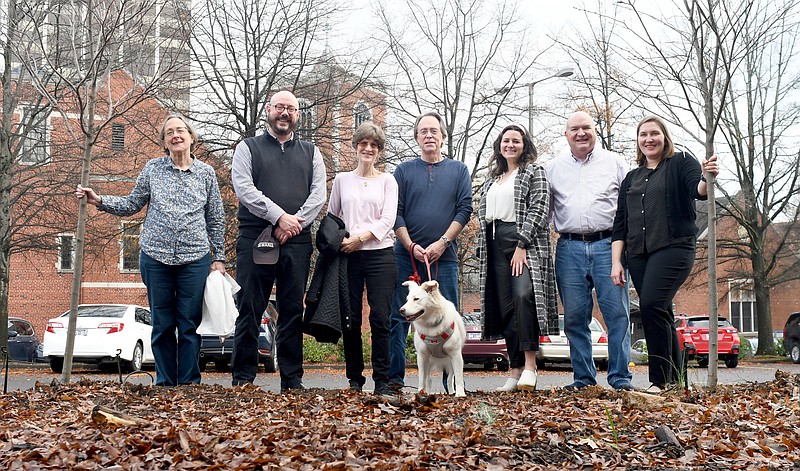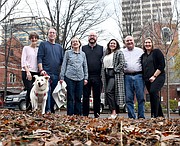Among the only faith-based groups in the state that focuses on climate change, Tennessee Interfaith Power and Light in Knoxville has a single part-time paid worker, Dan Joranko. He's pushing congregations to apply for the Cool Congregations Challenge -- an effort to encourage religious groups to be "sustainable role models in response to climate change."
Chattanooga-area participation has been slim so far, but Angela Dittmar intends to put a new St. Paul's Episcopal Church project in the running. Recently, the congregation determined some invasive Bradford pear trees on its downtown grounds were threatening property damage and stunting native plant growth. Parishioners replaced them in November with, among other things, tulip poplars, Tennessee's state tree.
Dittmar said the project, which on Thursday was officially named "St. Paul's Native Garden," helps her see the urban parish in terms of the ecosystem in which it participates.
"As Christians," she said, "we are asked to think of the bigger picture."
From laypeople to bishops, from liberals to conservatives, many Christians see the handiwork of God in the complex systems that sustain life on Earth. But they disagree on how -- or even whether -- they should work to preserve those systems for future generations.
Those divides were apparent in a November Pew Research Center study, which found Christians, and evangelicals in particular, are more likely than the average U.S. adult to doubt the science linking fossil fuel emissions to climate change, and even less likely to think climate change is a significant issue.
The result, which researchers largely attribute to the alignment between evangelicals and the Republican Party, surprised practically no one. But it reflects just the surface of a deep and sometimes surprising history of environmental activism and debate within many Christian traditions, including in the greater Chattanooga area.
Changing posture
Perhaps no denomination embodies that complexity more clearly than the Southern Baptist Convention. In a 1970 resolution, the Nashville-based denomination urged "Christians everywhere to practice stewardship of the environment and to work with government, industry, and others to correct the ravaging of the Earth." It said that, in polluting the air, streams and soil, "man has created a crisis."
In the 1980s, however, white evangelicals overwhelmingly moved into a Republican Party which has for decades seen environmental regulation as an impediment to free enterprise. By the 2000s, the Southern Baptist Convention was putting its moral weight on the side of climate change skeptics -- a history researchers have detailed in the Bulletin of the Atomic Scientists.
Southern Baptist churches have unique autonomy, and factions have independently expressed distinct views on climate change. But at an institutional level, the largest Protestant denomination in the U.S. now counsels against climate change alarmism.
Photo Gallery
Climate change and Christianity: Some Chattanooga area believers find small acts of stewardship are a start
In January, the policy and research arm of the Southern Baptist Convention put out an article arguing that, while people should consider adopting more sustainable practices to better care for God's creation and as a means of maximizing the Earth's production, humans should take solace in the knowledge that God will eventually renew everything. The article compares the dire warnings of climate scientists to the Y2K doomsday predictions, and frowns upon those in the media who describe climate change as a "crisis."
Tribulations
Wes Jones isn't totally opposed to renewable energy, but he's skeptical.
"We're stewards of the world God's given us, and so we need to do the best we can to take care of it and not abuse it or try to mess it up any more than it already is," he said by phone.
Jones coordinates disaster relief efforts for the Tennessee Baptist Mission Board, which has responded to about 270 disasters to help people rebuild since the branch formed in the 1970s. About 117 -- nearly half -- of those missions have taken place in the past seven years.
(READ MORE: Chattanooga-area Baptist group helps clean up after Hurricane Ian)
Jones said he isn't sure what's behind the increase in relief missions, but he is inclined to interpret the dynamic not through climate science but through scripture, which foretells major tribulations before the coming of Christ. In this view, the natural disasters are sad, but no surprise -- an occasion to share Christ and support people in need, he said.
"We want to try to help out as much as we can," he said.
Scripture helps many Americans explain the world. But their views on climate change tend to be rooted in their political identity and the experiences that shape it, said Joe Witt, a religious studies professor at the University of Tennessee, Knoxville.
"Theology comes in to justify the position," he said by phone earlier this month. "But it's not really the cause."
One example of the complex relationship between religion and politics played out in Appalachia in recent decades, as a diverse group of religiously-minded locals teamed up with outside environmental activists to fight the mountaintop removal mining many felt was desecrating their home.
In his research for a book on the conflict, "Religion and Resistance in Appalachia," Witt found that activist West Virginia Catholics and Protestants drew conviction from their faiths – emphasizing the biblical concept of "creation care," for example – even as their belief-systems clashed, hybridized and formed anew in the process of struggling together.
Mountaintop removal, however, is more concrete than global climate change, whose abstractness and scope don't as obviously connect with lived reality. For many skeptics, climate change is negligible -- or, from another angle, not of the human realm at all.
The Pew survey found that among those who don't think climate change is a serious problem, the two "most commonly cited reasons are that there are much bigger problems in the world today and that God is in control of the climate."
Dominion
Faced with the scale of the climate change challenge, some people seek security in more fundamentalist versions of their faith, said Mary Evelyn-Tucker, a Yale University environmental ethicist who co-directs the school's forum on Religion and Ecology. But, she said by phone, she believes those interpretations cede the values of responsibility and creativity, which are essential to the climate change fight and are at the heart of what it means to be human.
What does the Bible call humans to do about climate change? It depends who you ask. For Sara Orellana, who until 2019 was the Creation Care Chair for the United Methodist Church's East Tennessee-based Holston Conference, the answer comes down to how you define "dominion," a prominent word in many English translations of the Bible.
To her chagrin, she said by phone, the general consensus in the faith world is that "'dominion over the planet' means you can do anything you want with it."
But the word, like "stewardship," has had several varying interpretations in recent decades -- and is the subject of increasingly robust debate. Theologians in divinity schools across the country, from Yale to Baylor University to Tennessee's University of the South, are actively studying how scripture speaks to the ecological problems of our time, Tucker said.
Skeptics in the pews might sniff in this Earth-oriented theology a kind of pagan "nature-worship." Some point to the famous Bible passage in which Paul said humans invited God's wrath in worshiping and serving "created things rather than the creator."
That passage does not bother Orellana, who finds in gardening a sacred connection to the Earth.
"God created the garden for us to be in relationship with him and with the garden," she said. "I can't possibly worship the creation independent of the creator."
The garden
Shortly after becoming a member at St. Paul's Episcopal Church around 2014, Dittmar joined Bruce Blohm at the parish's Green Faith ministry to help organize the St. Paul's Sweet Potato Project.
At first they sought to cultivate the nutritious, low-maintenance, root vegetable on the church property, but the effort largely flopped, and they had more success encouraging people to grow them at home or at work, Dittmar said by phone.
Participants donated part of their harvests to the Chattanooga Community Kitchen and other local nonprofits, Dittmar said. The idea grew "beyond the bounds of our own congregation." There were returning gardeners, "one-year gardeners," farmers at universities, farmers down in Georgia, farmers at other churches.
The garden idea, of course, runs deep in the Christian tradition. After the Roman Catholic Pope Francis put out Laudato Si, the landmark -- and to some, deeply radical -- 2015 encyclical critiquing consumerism and emphasizing creation care, Knoxville Bishop Richard Stika reflected in his monthly column that "there is something refreshing and spiritual about getting down close to the earth and in helping the soil to become fruitful."
He did not get into the policy prescriptions in the Pope's letter, which insisted that fossil fuel-based technology should be "progressively replaced without delay." Instead, Stika emphasized that Catholics should be gardeners of not just earthly creation but also souls.
"No matter where you might stand on the subject of global warming," Stika wrote, "the essence of the document is about stewardship of the Earth that must not exclude the primacy of a human ecology."
All religious groups have liberal and conservative members that leaders might try to accommodate. About half of U.S. adults Pew surveyed said "the Earth is getting warmer mostly because of human activity." Nine in ten atheists believed that, while seven in ten from non-Christian religions did.
About three in ten evangelicals agreed.
Answers mapped strongly onto political party affiliation. And Pew found the views of mainline Protestants -- such as Presbyterians and Methodists -- closely tracked those of the U.S. population as a whole.
The Presbyterian Church of the United States of America has criticized the "thoughtless burning of fossil fuels." The Global Ministries Earthkeepers train Methodists to launch and grow environmental projects in their local communities. But like many Americans, even those denominations are often preoccupied with other things.
(READ MORE: Chattanooga-area churches take steps to leave the United Methodists)
Orellana, the former Creation Care Chair for the Holston Conference, feels her own Methodist denomination has been distracted by the ongoing fight over church sanction of gay marriage. It "changed the whole political dynamic," she said, adding that "it's really hard to get traction anywhere to talk about the environment and creation care."
As chairwoman of the Chattanooga chapter of Tennessee Interfaith Power and Light, Sandra Kurtz has spent years working, with mixed success, to convince area faith groups that the fight to reduce carbon emissions is worth their time.
For many conservative Christians, "the need is to be saved to get to heaven," said Kurtz, a Unitarian Universalist Church of Chattanooga member.
"And that's not what we're saying," she said by phone. "We're saying, 'We need to do something in the here and now to sustain our species and our ongoing existence on the planet.'"
It's a big challenge, but for now, a small set of Chattanooga-area Christians approach it via relatively modest, concrete initiatives.
The sweet potato project reminded Dittmar that she had the power to "participate in and influence the world," she said.
Now on to the tree project, and with its first stage complete, she said parishioners hope to establish a modest habitat that can "support creatures of all sizes," from microbes to ants to large birds. She said they'll use the concept of a forest ecosystem -- a canopy, an understory, berries near the ground -- as inspiration for their own design.
Contact Andrew Schwartz at aschwartz@timesfreepress.com or 423-757-6431. Follow him on Twitter @aonSchwartz.

